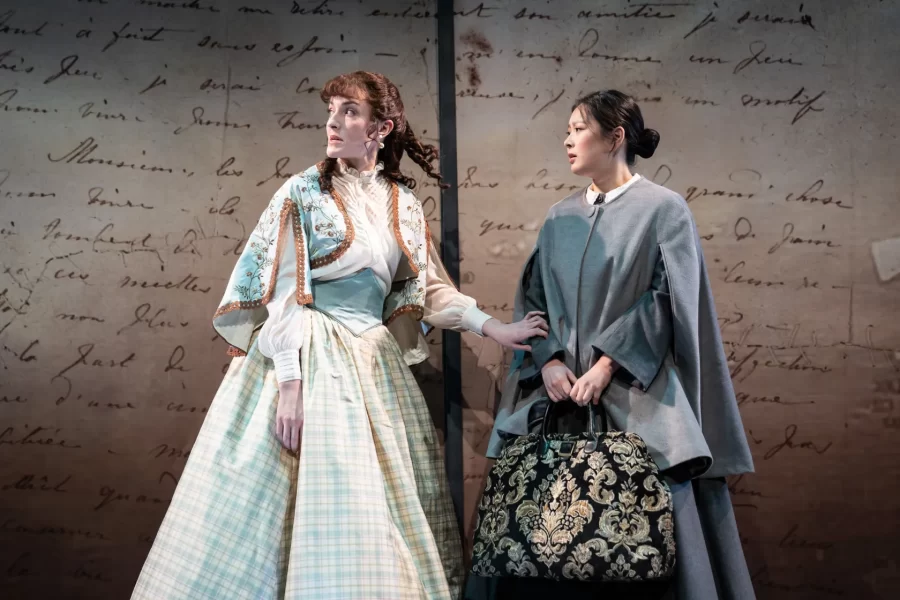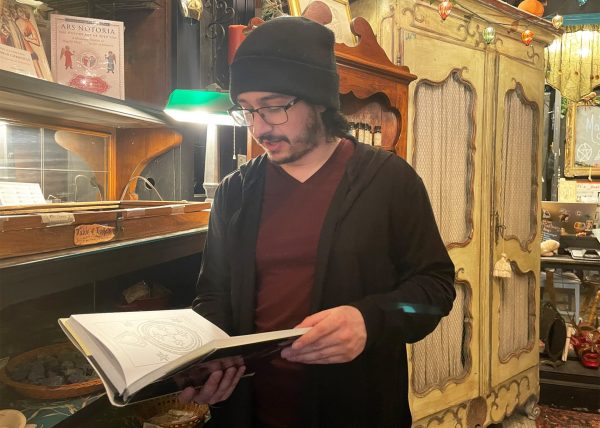Lookingglass Theater’s “Villette” is a ‘moody, mesmerizing tale of love and solitude’
Credit: Liz Lauren
The Lookingglass Theater’s production of “Villette” based on Charlotte Brontë’s titular novel.
Coinciding surprisingly neatly with the theatrical release of “Emily,” a historical drama chronicling the life of “Wuthering Heights” author Emily Brontë. Chicago’s own Lookingglass Theatre also seems to have Bronte on the brain with the opening of their newest world-premiere play, “Villette.” “Villette,” written by Emily’s sister Charlotte, Lookingglass bills it as Charlotte Brontë’s undiscovered masterpiece, a sweeping, moody tale of a mysterious young woman’s life in provincial France. With a bright, unflinching lead in Mi Kang, “Villette” is a mesmerizing, if unbalanced, staging of what could go on to be a modern classic.
Starring Mi Kang, Debo Balogun, Helen Joo Lee, Ronald Roman-Melendez, Renee Lockett and Mo Shipley — a modest but rock-solid ensemble cast — “Villette” follows the introverted, whip-smart Lucy Snowe (Kang), a young English woman who journeys to provincial France in the wake of an unspecified family tragedy. Her time in France is marked by unlikely success, friendships, and possible romance, in addition to the ever-present shadow of a ghost that seems to haunt the grounds of the school where Lucy teaches.
Though the plot doesn’t sound like much of a good time on paper, there’s a remarkable sense of humor and comedic sensibility that bears the mark of a strong director and a fondness for regency-era romance. Lucy is a spirited protagonist, prone to fourth wall breaks and frequently babbling to the audience, often at the expense of characters she’s sharing the scenes with. The Lookingglass Theatre’s unique space and staging also lends the production and its cast a capacity for interaction with the crowd that would be lost at a different venue.
In addition to a fresh, witty sense of humor where needed, “Villette” is most prominently a capital “G” capital “R” Gothic Romance, a tragic, sweeping tale full of pining, hidden love letters, and ghosts of dead lovers. Where act one’s tone is closer to that of “Pride and Prejudice” or “Emma,” especially in its characterization of Lucy alongside Kang’s energetic, tongue-in-cheek performance, act two turns up the drama, feeling much more like a sister piece, if you’ll pardon the pun, to “Wuthering Heights.”
On one hand, the changes between acts in tone and focus is a testament to the versatility and flexibility of the ensemble cast, but it does make for somewhat of a jarring, dissatisfying experience as an audience member. This particular issue is encapsulated in the two love interests “Villette” proposes for Lucy: the charming, down-to-earth Dr. John (Roman-Melendez) and the stiff, haughty but achingly earnest Mr. Paul (Balogun).
It’s hard to pick which character is better, per se. Certainly, both actors give impressive albeit drastically different performances, and both share remarkable chemistry with Kang. The majority of the first act is spent building towards a possible romance between Dr. John and Lucy, only to shift focus to a new, equally-laborious and time-consuming relationship with Paul.
Though adapting from a revered novelist means the book by playwright Sara Gmitter cannot veer too far from the plot of the novel, “Villette’s” acts almost feel like different plays about the same woman. They are both compelling and valuable in their own right, but when viewed in immediate succession, they feel as if they are in competition rather than building a continuing narrative for one woman.
One of the few through lines is Lucy’s “friendship” with spoiled, giggly student Ginerva Fanshawe, a hellish mix of Harriet Smith and Emma Woodhouse. Though her character is presented as the obvious comic relief, she often feels overblown and hammed-up, especially considering the scale of the theater and audiences’ proximity to the performers. Undoubtedly, though, Ginerva is a role with interesting potential, should “Villette’s” world premiere find the momentum to expand or travel following its run at Lookingglass.
Though not all of “Villette’s” narrative choices are particularly effective, the production design and costuming are airtight and expertly conceptualized. The atmosphere director Tracy Walsh is able to conjure and maintain makes for an enrapturing performance, even in weaker moments. The costume design in particular with heavy fabrics and wide skirts, courtesy of Mara Blumenfeld, lends “Villette” some striking visuals.
While this world-premiere production of an underrecognized Bronte sister novel may have a few structural kinks to work out, Lookingglass Theatre’s “Villette” is a moody, mesmerizing tale of love and solitude. Spearheaded by the unflinching Mi Kang in what is an undeniable star turn, “Villette’s” six-person cast is the beating heart of this Bronte play.












